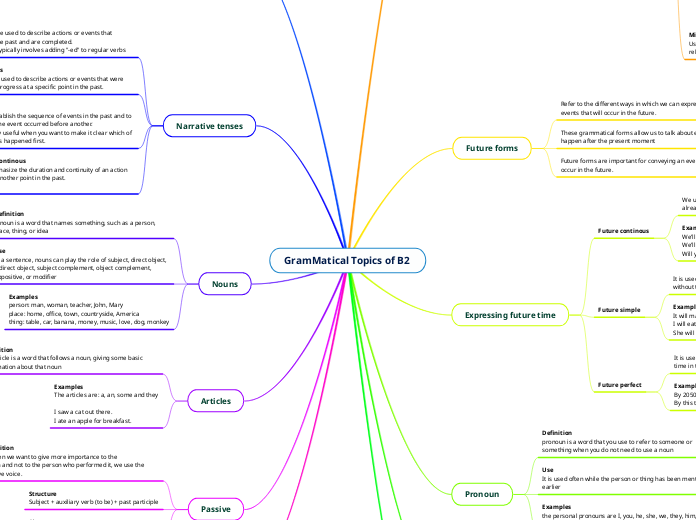GramMatical Topics of B2
ING termination
Verbs in English that end up in «ing» when we find ourselves in English ending in -ing and do not refer to adjective means that they are a verb
Passive
Use
The passive voice is often used in formal texts.
Structure
Subject + auxiliary verb (to be) + past participle
Definition
Is when we want to give more importance to the
action and not to the person who performed it, we use the passive voice.
Articles
Examples
The articles are: a, an, some and they
I saw a cat out there.
I ate an apple for breakfast.
Definition
An article is a word that follows a noun, giving some basic information about that noun
Nouns
Examples
person: man, woman, teacher, John, Mary
place: home, office, town, countryside, America
thing: table, car, banana, money, music, love, dog, monkey
Use
In a sentence, nouns can play the role of subject, direct object, indirect object, subject complement, object complement, appositive, or modifier
Definition
A noun is a word that names something, such as a person, place, thing, or idea
Narrative tenses
Past perfect continous
is used to emphasize the duration and continuity of an action leading up to another point in the past.
Past perfect
- Is used to establish the sequence of events in the past and to indicate that one event occurred before another.
- It's especially useful when you want to make it clear which of two past events happened first.
Past continous
is a verb tense used to describe actions or events that were ongoing or in progress at a specific point in the past.
Past simple
- Is a verb tense used to describe actions or events that happened in the past and are completed.
- In English, it typically involves adding "-ed" to regular verbs
Pat tense
Examples
Would + Simple Past
If I had more money, I would have bought a new car.
Use
It is used to describe actions or situations that happened and were completed at a specific moment in the past
Form
It is generally formed by adding "-ed" to the end of regular verbs.
Infinitive verb
Bare Infinitive
Used after modal verbs (can, could, should, etc.) and in certain other cases.
Examples
I can swim," "They must go."
Forms of the Infinitive
To + Base Form: The most common form in English. Used in a wide range of contexts.
Examples
"to run," "to dance," "to learn."
Examples
"to read," "to write," "to sing."
Definition
The infinitive is the purest form of a verb, unmarked by tense, person, or number.
Determines
Examples
Determines are: a, the, some, this, and each
These apples are good
Jim is her brother.
Use
It is use in things you are refering to or whether you are referring to one thing or several
Definition
Is the beginning of a noun group to indicate
Pronoun
Examples
the personal pronouns are I, you, he, she, we, they, him, her, he, she, us and them
Use
It is used often while the person or thing has been mentioned earlier
Definition
pronoun is a word that you use to refer to someone or something when you do not need to use a noun
Expressing future time
Future perfect
Examples
By 2050, researchers will have found a cure for cancer.
By this time next year, I’ll have graduated.
It is used for actions or states that will have ended at a given time in the future.
Future simple
Examples
It will make you laugh.
I will eat that..
She will climb that mountain
It is used to describe actions that will take place in the future, without the need to specify when.
Future continous
Examples
We’ll be coming next weekend.
We’ll be leaving at 8 a.m. tomorrow.
Will you be going home this summer?
We use the future continuous for future events that have already been planned or decided.
Future forms
Future forms are important for conveying an event that will occur in the future.
These grammatical forms allow us to talk about events that will happen after the present moment
Refer to the different ways in which we can express actions or events that will occur in the future.
Modal verbs and conditional
Conditionals
Mixed conditional
Used to express complex or unconventional conditional relationships
Example
If she were here, she would have been excited (past unreal result).
Structure
- Second conditional (if clause) , Third conditional (main clause)
- Third conditional (if clause) , Second conditional (main clause)
Third conditional
Expresses unreal past situations and their hypothetical outcomes.
Example
If she had studied harder, she would have passed the exam.
Structure
If + past perfect , would have + past participle.
Second conditional
Expresses hypothetical or unreal situations in the present or future.
Example
If I won the lottery, I would travel the world.
Structure
If + past simple , would + base form of the verb.
First conditional
Expresses real possibilities and likely future events.
Example
If it rains tomorrow, I will stay home.
Structure
If + present simple , will + base form of the verb.
Zero conditional
Expresses general truths or scientific facts
Example
If you heat water to 100 degrees Celsius, it boils.
Structure
If + present simple , present simple
Modal verbs
Should
Suggest an obligation, advice or expectation
Must
Indicates strong necesity or
obligation
Ought to
Expresses moral obligation, duty,
or strong recommendation.
Would
Expresses past habits, polite requests,
or hypothetical situations.
Will
Expresses future actions
or predictions.
Have to
Indicates necessity, obligation,
or requirement.
Might
- Suggests a lower level of
probability than "may."
- Commonly used in uncertain or
speculative statements.
May
Indicates permission, possibility,
or a request for permission.

